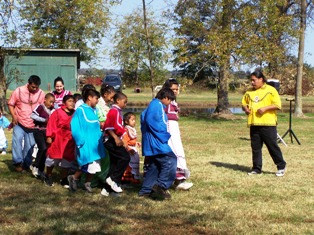Unit 3 Introduction
Reading: Chapter 3 in Macionis, pp. 69 - 93
Unit 3 covers the topic of socialization, or the processes through which humans become social beings. Socialization begins at birth and continues throughout our lives; whenever we enter a new group situation, we must learn the rules that govern social behavior, the expectations that others in the group have of each other, the modes of thinking that people in the group employ, the system of leadership and social control, and the tastes and preferences of the group members.
 Fig. 3-1: Learning Culture, Native American Days, Winterville Mounds, Mississippi |
Humans are born like blank slates, and cannot survive unless they learn and internalize a culture and a social structure. Primary socialization refers to the processes through which infants and children become integrated into a society. Secondary socialization refers to the supplementary processes that we go through to adapt to the groups and organizations that we work with throughout out lives. Thus, socialization is a lifelong process.
As we learned in the first unit, sociologists study both individuals and social structure. In studying socialization, sociologists examine both how socialization creates an individual identity, while at the same time producing and reproducing a social structure and a culture.
Some of the theories you will study about socialization may seem more psychological than sociological. They fall within an area of the social sciences known as "social psychology." Social psychologists study the intersection between the normative (social) and cognitive (personal) realms, emphasizing the proceeses through which individuals adapt to cultural norms. Theories by Freud, Piaget and Erickson bridge themes in sociology and psychology.
In Unit 3, you will begin to see how society shapes its members and exerts control by placing limits around acceptable forms of behavior, and helps us interact by creating a sense of normalcy.
GO TO WEEK 3 GOALS AND OBJECTIVES>>>
<<<GO TO WEEK 1 THRU 5 SCHEDULE